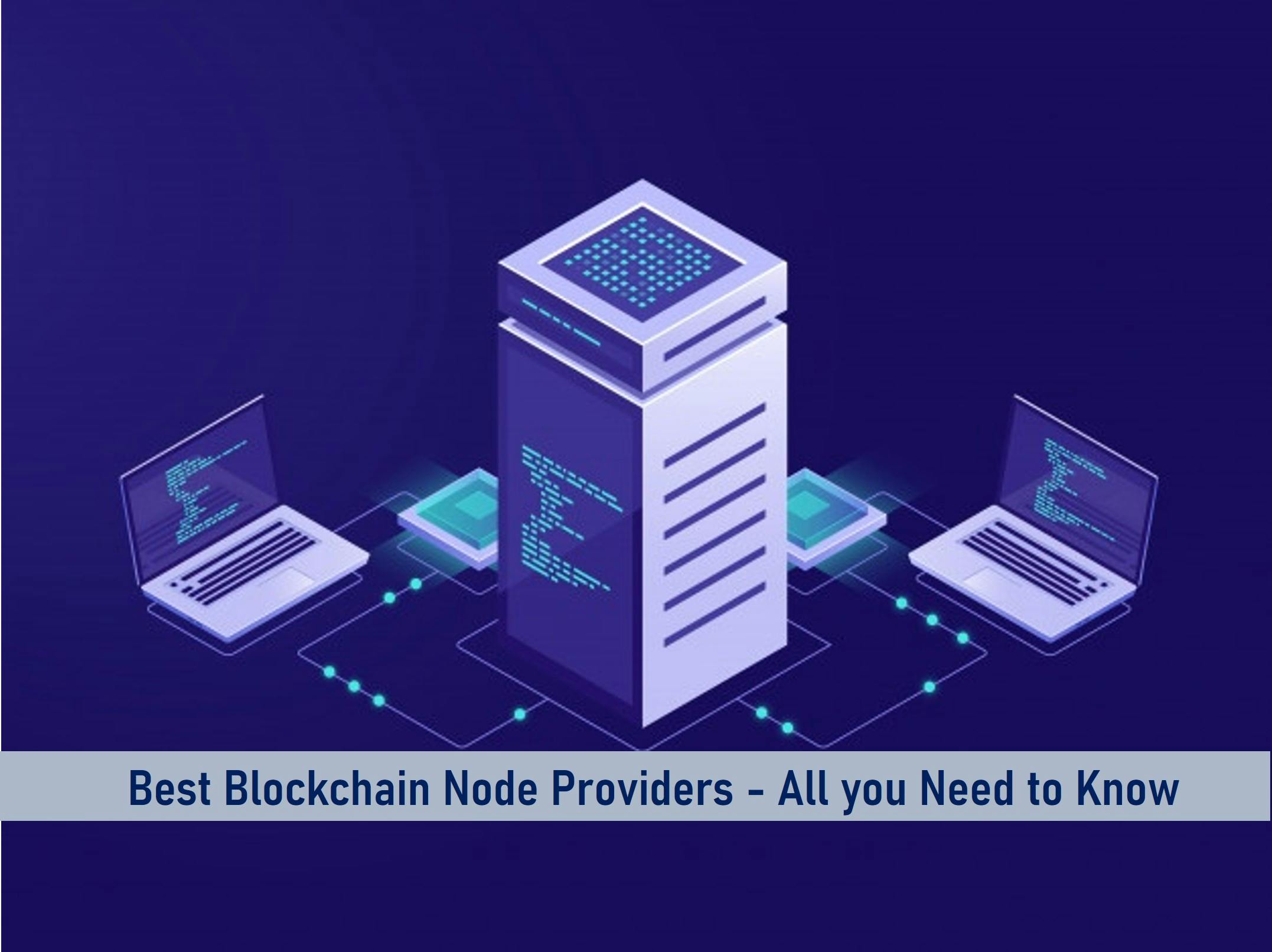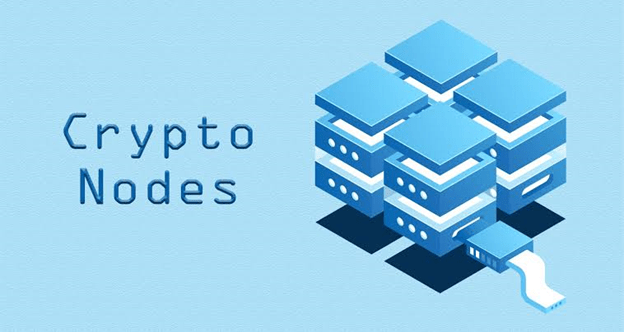
What is a Blockchain Node?
A “node” is a term used in blockchain technology. A node is a decentralized ledger that records all blockchain transactions and makes the records available to anyone through a connected device. A blockchain node verifies each batch of a transaction known as the blocks and sends them to the user upon request.
Blockchain nodes act as communication points, where the interaction with the actual blockchain happens, these nodes serve a wide variety of purposes in running the network efficiently.
In this article, I’ll explore all you need to know about the blockchain node, the various types, and the Best blockchain node providers.

Key Takeaways
• Unlike QuickNode, GetBlock does provide a free tier of its service, up to 40,000 requests per day. This means that GetBlock’s pricing caters to a wide range of different clients.
• The blockchain-native architecture delivers peak reliability by powering each piece of node functionality with dedicated, distributed infrastructure, the same kinds of systems used by Facebook and Amazon for achieving massive scale.
• Blockchain nodes also talk to other nodes to learn about the state of the network as these nodes that connect are generally referred to as “peers”.
To name a few of the roles that blockchain nodes can play in the blockchain, they perform tasks like rejecting or accepting transactions. Additionally, they can store the blocks, which are cryptographically linked, and manage transactions and control their validity.
Blockchain nodes also talk to other nodes to learn about the state of the network. These nodes that connect are generally referred to as “peers”. You might also be interested to know that there are different types of nodes, e.g…
1. Full nodes,
2. Light nodes, and
3. Archive nodes.
Understanding the nature and expectations of blockchain nodes should prompt the quest for the best blockchain node providers. As the name implies, a blockchain node provider is a service that provides blockchain nodes, like Infura.
If you use a blockchain node provider, you do not need to set up and manage your blockchain node, this saves time and resources. Nevertheless, not all blockchain node providers are created equal. Some provide functionality more geared towards your unique use cases and requirements.
Let’s explore the best blockchain nodes providers out there.
1. NOWNodes
NOWNodes proposes an effective solution to assist various businesses and entrepreneurs. The company offers blockchain-as-a-service which provides full access to nodes and explorers via API. NOWNodes supports more than 55 blockchain networks and provides safe and fast blockchain services.
The company offers cost-effective and reliable API services for nodes and block explorers through premium quality infrastructure. It guarantees high security for the nodes by constantly monitoring them. Its services also are easily scalable to suit the growing demands of blockchain companies.
Features:
- 55+ blockchain networks
- 24/7 Access
- Affordable pricing plans
- Free plan available
- REST API
- Security
- Low-Latency
- Immediate Deployment
- Fast connection
- SQS
Steps to Use NOWNodes
Using the NOWNodes platform is very easy. It takes just a minute to connect to the nodes you want to use.
Pick a node address and send the request. It is simple to integrate nodes and explorers into an existing setup without any hassle.
- Sign up/log in on NOWNodes
- Choose a plan:
- Standard – 100 000 requests
- Pro – 30 000 000 requests/mo
- VIP – 100 000 000 requests/mo
- Get your own crypto API
NOWNodes makes it possible to manage all your nodes and block explorers in one place. The company’s support team is efficient, knowledgeable, responsive and friendly. You can also contact the support team for more information. Don’t forget to follow the official twitter account of NOWNodes and be aware of any news and updates.
2. Moralis
Moralis is a fully managed, infinitely scalable Web3 backend infrastructure. This means that dApp and Web3 app developers do not need to worry about the hassle traditionally associated with Web3 development.
Developers do not need to waste time, money, and resources setting up their blockchain backend infrastructure, and they can get right to work. As such, developers can focus on what they do best, creating great dApps.
Moralis comes with all the bells and whistles you know from Infura. This includes IPFS support, and Moralis is an excellent blockchain node provider alternative. However, whereas Infura is largely limited to the Ethereum mainnet and Testnet, Moralis is built from the ground up for cross-chain support.
At the moment of writing, Moralis already support the three high-profile blockchains Ethereum, Binance Smart Chain, and Polygon (formerly Matic). Nevertheless, Moralis has got support for many more blockchains in the pipeline and will keep striving to introduce untold more.
Moralis came out of beta on June 1st, 2021, with the release of the Moralis 1.0 “Enlightenment” Update. This first production release of Moralis contained features like Moralis’ Speedy Nodes and the Moralis Deep Index API.
Moralis’ Speedy Nodes allows you to easily connect to nodes without any of the traditionally associated issues. As such, make sure to try Moralis’ Speedy Nodes functionality. This will give you access not only to Ethereum Endpoints but also to Binance Smart Chain and Polygon (formerly Matic).
Moreover, Moralis doesn’t store anything. Moralis doesn’t log your requests or users’ IP addresses. As such, when you use Moralis, you know that your users are in good hands. Keep in mind to check out a project’s privacy policy when you choose a node provider.
SEE ALSO: 7 Best Bitcoin Blockchain Explorers for Confirming Transactions
SEE ALSO: Amazing Blockchain Developer Salaries Around the World
3. QuickNode
QuickNode seeks to help various blockchain ecosystems grow in a scalable manner. A key part of achieving this is node providers. As such, QuickNode provides developers with Web3 development tools and is an exciting alternative to Infura.
QuickNode also has support for more chains than merely Infura, which can be a big advantage. Be sure to do your research and find out whether QuickNode is right for you. The main drawback with QuickNode is that there is no free alternative, although the cheapest plan gives you the first seven days for free as of June 2021.
4. GetBlock
GetBlock is a blockchain-as-a-service platform that serves as a blockchain node provider. GetBlock lets you request on-chain information from certain nodes (including Ethereum, BSC, and more) with REST, WebSockets, and JSON-RPC, without needing to manually set up the node itself.
Unlike QuickNode, GetBlock does provide a free tier of its service, up to 40,000 requests per day. This means that GetBlock’s pricing caters to a wide range of different clients. You can take a closer look at GetBlock’s documentation to decide whether it is something for you or not.
5. Alchemy
Alchemy Supernode is an infrastructure engine specifically designed for Web 3.0. The blockchain-native architecture delivers peak reliability by powering each piece of node functionality with dedicated, distributed infrastructure, the same kinds of systems used by Facebook and Amazon for achieving massive scale.
Alchemy Supernode also ensures the data is always correct, real-time, and in sync across every corner of the system thanks to a proprietary coordinator service.
This allows Alchemy Supernode to scale quickly, gracefully, and infinitely so developers never need to worry about maintaining infrastructure again. Like the rest of the Alchemy developer platform, it’s fast and simple to set up. No code, no configuration, it works out of the box.
SEE ALSO: How Can I Trace a Bitcoin Address?
6. Blockdaemon
Blockdaemon is the leading independent blockchain node infrastructure to stake, scale, and deploy nodes with institutional-grade security and monitoring. Supporting 40+ cutting-edge blockchain networks in the cloud and on-premise.
Blockdaemon is used by exchanges, custodians, crypto platforms, financial institutions, and developers to connect commercial stakeholders to blockchains.
We power the blockchain economy by simplifying the process of deploying nodes and creating scalable enterprise blockchain solutions via APIs, high availability clusters, auto-decentralization, and auto-healing of nodes.
Frequently Asked Questions (FAQ)
1. Is Blockchain better than Cloud?
Blockchain guarantees the prevention of the tempering of data without relying on any third-party trusted centralized authority, whereas the cloud does not assure complete integrity and tamper-free data. Cloud computing can push the execution of blockchain technology-based projects.
2. Where is Blockchain data stored?
Blockchain is decentralized and hence there is no central place for it to be stored. That’s why it is stored in computers or systems all across the network. These systems or computers are known as nodes. Each of the nodes has one copy of the blockchain or in other words, the transactions that are done on the network.
3. Does Blockchain use a database?
Blockchain uses decentralized storage of data. The database needs a Database admin or Database administrator to manage the stored data. There is no administrator in Blockchain. Modifying data requires permission from the database admin.
SEE ALSO: Is Blockchain Development a Good Career?
Final Thoughts
Blockchain nodes are very important to certain activities that happen on the Blockchain network. One of these activities includes transactions carried out on the network. It is for these reasons we have listed out the top Blockchain providers out there, describing their features and usefulness to users.
Read More




